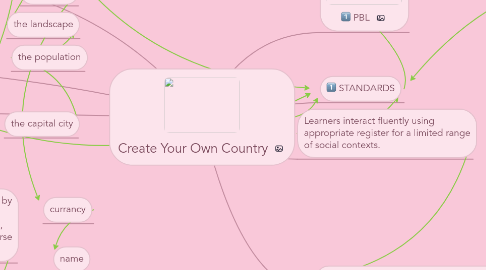Create Your Own Country
by Moran Jacobson Gal On

1. Learners access information in English from oral and written texts from a wide range of printed and digital media and make use of that information for a variety of purposes
2. Learners obtain and use information by applying knowledge of vocabulary, grammar, punctuation, text structure, digital media and a variety of discourse markers.
3. follow directions and a sequence of complex instructions in a variety of contexts.
4. interpret information from visual data, such as graphs, diagrams, and maps.
5. use information tools, such as a dictionary or simplified Web 2.0 tools.
6. use of former knowledge to describe your country
7. currancy
8. name
9. the language
10. the political structure
11. the culture
12. the landscape
13. the population
14. the capital city
15. Learners appreciate the nature of language and the differences between English and other languages. Learners appreciate literature that is written in English and through it develop sensitivity to a variety of cultures.
16. Learners are aware of various ways in which English differs from their home language.
17. Learners become acquainted with norms and behaviors in a variety of cultures.
18. students learn about different cultures
19. they need to do reasarch
20. are aware of differences in cultural conventions in English and their mother tongues, such as in greetings.
21. PBL
22. STANDARDS
23. Learners interact fluently using appropriate register for a limited range of social contexts.
24. Learners use appropriate vocabulary and accurate grammar for this level.
25. express and elaborate on personal wishes and opinions.
26. interact for a variety of purposes, such as agreeing and disagreeing, giving and following instructions and directions, complimenting, and giving advice.
27. engage in conversations about general topics, such as current events, and future plans, using language to suit context, audience and purpose.
28. create, collaborate and respond to a variety of written texts in print or handwriting, as well as digital media
29. follow directions on how to create your city
30. use new vocabulary
31. make decisions as part of a group
32. able to have discussion
33. use the new vocabulary and future tense correctly
34. higher order thinking skills
35. group work
36. authentic task
37. focus on learner
38. process
39. Learners present ideas and information in an organized, planned manner in a variety of formats in spoken and written English on a wide range of topics, using print and digital media.
40. Learners organize and present ideas and information orally and in writing about general topics, suiting register and text type to purpose and audience.
41. Learners use appropriate vocabulary and accurate grammar for this level, incorporating discourse markers, following conventions of prosody/print.
42. express ideas and opinions about general topics using main and supporting ideas
43. use digital media tools, such as pod casts and Web 2.0 tools.
44. review and edit presentations based on feedback from peers/teacher.
45. alternative assessment
46. present your country to the class
47. give respectful and informative feedback to your classmates


